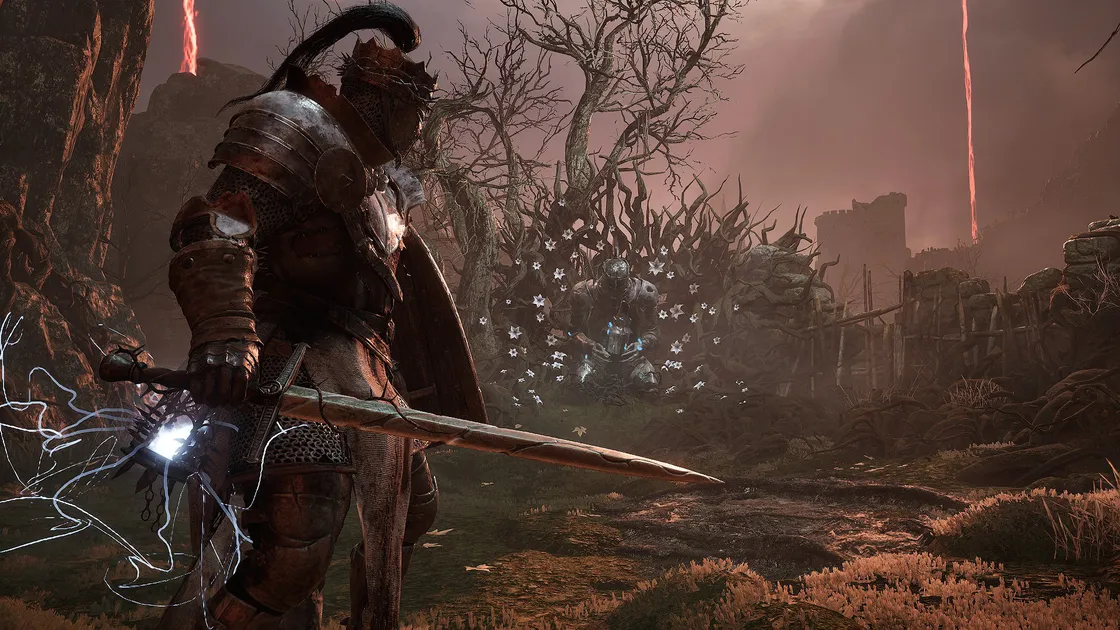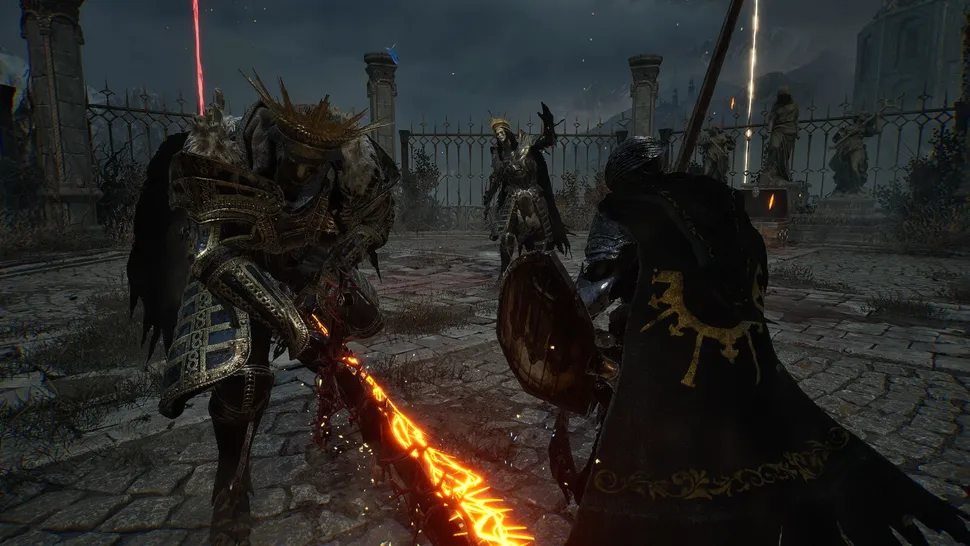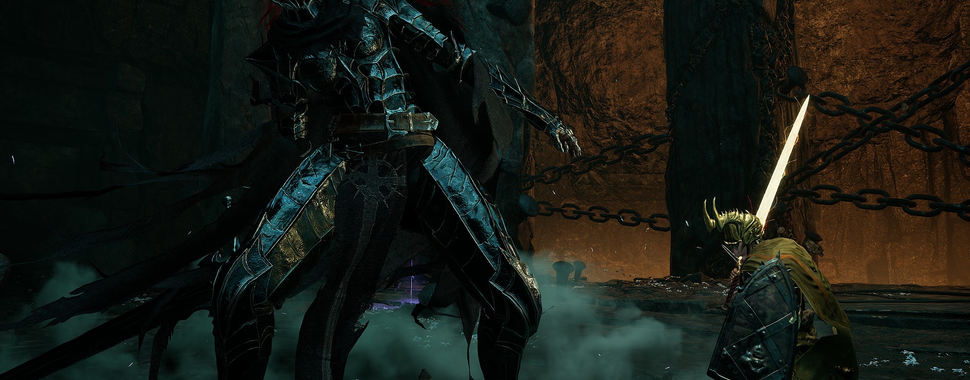Lords of the Fallen Review
- Mekel Kasanova
- Oct 15, 2023
- 5 min read
Updated: Oct 16, 2023
Release date: October 13, 2023
Developers: HEXWORKS, Defiant Studios
Engine: Unreal Engine 5
Platforms: PlayStation 5, Xbox One, PlayStation 4, Xbox Series X and Series S, Microsoft Windows
Genres: Action role-playing game, Adventure game, Fighting game, Adventure
Mode: Multiplayer video game
Publisher: CI Games
"Review Copy Provided By CI Games"0
Lords of the Fallen: A Sturdy Swipe at Soulslike Success
While 2014’s original "Lords of the Fallen" courageously attempted to capture the magic created by FromSoftware, it fell short of the lofty goal. Fast forward nearly a decade amidst an ocean of soulslike imitators, the moment is ripe for a second attempt - and pleasingly, the new, perplexingly identically titled Lords of the Fallen, solidly finds its mark. Offering a world split into two realities to navigate, multifaceted and intricate buildcrafting, and slick, rewarding combat, it’s easy to overlook the elements it borrows from its predecessors. However, it's not without its issues, such as notable performance glitches and unchallenging boss battles, which prevent it from landing a knockout punch, yet I foresee countless more hours piercing foes and meticulously exploring its ingeniously divided world.

Engaging the action-RPG soulslike trend, Lords of the Fallen introduces us to a hauntingly fantastical realm, encompasses cooperative and player vs. player invasions, and naturally, a significant amount of demises. Employing a lethally familiar third-person combat system, complete with dodge rolls, posture meters, and enemy-taunting emotes, it undoubtedly drinks from the FromSoft well, especially Dark Souls, yet there are excitingly unique elements to explore. This includes intriguing dual-reality mechanics and a magical lamp enabling soul extraction from enemies, adding a fresh layer to its derivative foundations. Despite the thrill of new releases in the genre, the continual flood of soulslike titles, and their shared mechanics and clichés, is becoming increasingly wearisome. Recognizing familiar patterns like anticipating ambushes from concealed monsters or navigating poison-inflicting swamp creatures has become second nature, along with memorizing myriad names for healing items across various games, serving up regular doses of déjà vu.
If "Lords of the Fallen" rings a bell, that’s due to its shared title with the 2014 release from developer Deck13. However, devoid of a “2” or similar sequel indicator, this rendition is more of a reboot than a continuation. While previous players may encounter familiar NPCs, locations, and terminology such as “The Rhogar” and “Adyr”, new developer Hexworks only incorporated the fundamental elements from the first game. Encouragingly, the story, formed from reused and repurposed bits, surpasses its predecessor, providing a more comprehensive world, some intriguing characters, fascinating lore, and compelling world-building, even though sometimes it might feel concealed beneath a heap of generic dark fantasy vernacular.
Lords of the Fallen, while borrowing substantially from its contemporaries, sets itself apart with its most original and captivating idea: the ability to switch between two realms at any point. Axiom, the perceptible physical world, overlays a dark, monstrous world named Umbral, accessible via a magic lantern. Navigating both realms, you're introduced to a unique exploration style, where certain physical structures in one realm can facilitate movement in the other, profoundly affecting every facet of the game. Moreover, interacting with the Umbral realm without fully immersing into it offers intriguing strategic gameplay, from navigating through obstacles to previewing hidden elements before completely transitioning. There’s also a fascinating survival aspect; instead of dying, players are involuntarily thrown into Umbral, where escaping back to reality involves locating hidden totems or reaching a checkpoint, all while being pursued by increasingly powerful enemies.

Even when the framerate behaves, the zones from the incinerated city of Calrath to a perilous mountain monastery are genuinely exciting to explore, showcasing some of the genre’s best recent level design, brimming with spectacular environments, hidden treasures, and a myriad of unique enemies introduced gradually through mini-boss battles throughout the roughly 40-hour campaign. Lords of the Fallen nods distinctly towards Dark Souls, striving to link each area of the map to a central hub and presenting numerous shortcuts and backtracking paths, albeit sometimes at the annoyance of encountering numerous unopenable doors. The engagement with hordes of ghastly skeletal monsters is a dynamic spectacle of blades and flails being swung and deflected, ensuring smoother gameplay than most of its counterparts, albeit feeling highly conventional at this point. The game allows you to embody various combat styles, from a heavy sword-and-shield warrior to a nimble, precise combatant, or various ranged magic users with typical abilities like blanketing levels with fire and lava or bestowing health-regenerating blessings upon allies and self. Enhancing weapons, spells, and embedding runes and other upgrades into your gear to apply special modifiers further extends the buildcrafting variety. With nine initial character classes to opt from (plus four unlockable later), there’s a generous scope for replayability and diverse, interesting playstyles, adding to the appeal of any action-RPG.
Moreover, traversing through challenging areas, teeming with elite enemies unleashing devastating attacks in constrained spaces with numerous fatal hazards, provides a fun, tense experience. Especially when thrust into the Umbral realm, which introduces additional enemies and threats. The key issue is the enemy intelligence – or lack thereof – not a unique issue in the genre, yet it's consistently amusing to witness these beings struggling to navigate through the world’s geometry, remaining static as you relentlessly assault them with electrifying projectiles.
The usage of your magical lamp and its connection to the parallel Umbral realm extends into combat utility, especially with its Soul Flay ability, which allows you to extract an enemy’s soul, immobilizing them and providing an opportunity to inflict damage. If you're feeling particularly malicious, you can even hurl their soul off a cliff, ensuring their body follows to a plummeting demise – particularly effective against troublesome adversaries near precipices. Also, some enemies boast supernatural shielding, rendering them practically invincible, which can only be neutralized using your lamp to illuminate a hidden eyeball nearby. Playing with the dual-reality switching during combat solidly underscores the brilliance of this mechanic. A novel concept introduced is Vestige Seeds, which can be planted at specified points throughout the world to create semi-permanent checkpoints at chosen intervals. If you find a certain section tricky and wish to avoid the stress of perishing before reaching the next static checkpoint, you can utilize a Vestige Seed to establish a temporary sanctuary along the way, taking cautious steps towards your ultimate objective. This introduces a delightful mini-game, where you’re deciding when to pause and use a seed, and when to risk pushing forward to see if you can navigate through the next few rooms before safeguarding your progress.
Naturally, no soulslike game is complete without magnificent boss battles against grotesque beasts, and Lords of the Fallen delivers some interesting ones, like a colossal crow attempting to entomb you in ice or a dragon-mounted mage concealing away your lamp. The scenarios are rather generic and lack originality in design, but their grandiosity and the power dynamics still elicit excitement. But due to a combination of unremarkable AI and telegraphed attack patterns, the battles are considerably less challenging than they appear, missing the adrenaline-pumping, edge-of-the-seat sensation from the likes of Bloodborne or Sekiro.
Despite the technical hiccups, such as minor crashes and occasional dropped framerates, plus the challenge of engaging with yet another game of the similar ilk, Lords of the Fallen charmingly won me over. With its impressive dual-reality mechanics, varied builds, and mesmerizing world design, it brings something new and exciting to the increasingly saturated soulslike genre. It may fall short of becoming the new benchmark, but Lords of the Fallen is a solidly engaging, gratifying, and promising step forward for Hexworks and its future endeavors in the action-RPG domain.


























































Comments